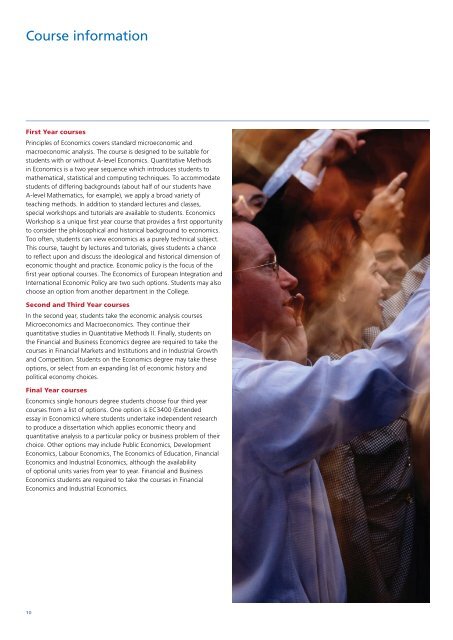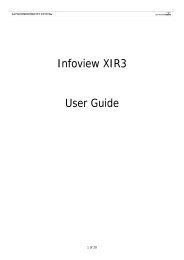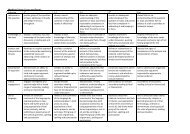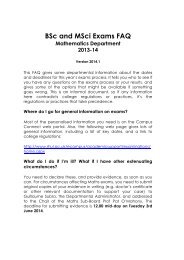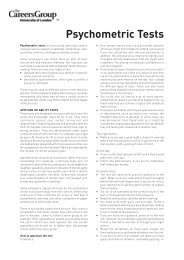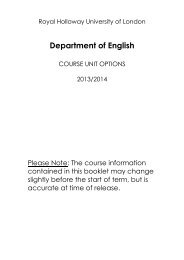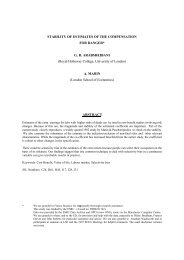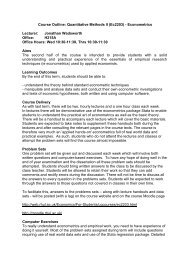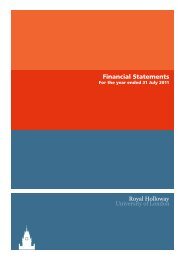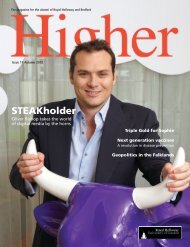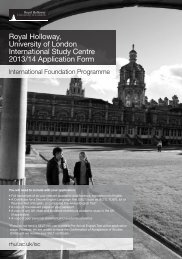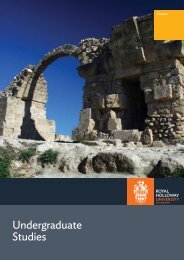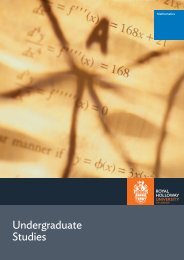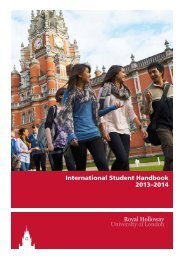Department of Economics - Royal Holloway, University of London
Department of Economics - Royal Holloway, University of London
Department of Economics - Royal Holloway, University of London
- No tags were found...
Create successful ePaper yourself
Turn your PDF publications into a flip-book with our unique Google optimized e-Paper software.
Course informationFirst Year coursesPrinciples <strong>of</strong> <strong>Economics</strong> covers standard microeconomic andmacroeconomic analysis. The course is designed to be suitable forstudents with or without A-level <strong>Economics</strong>. Quantitative Methodsin <strong>Economics</strong> is a two year sequence which introduces students tomathematical, statistical and computing techniques. To accommodatestudents <strong>of</strong> differing backgrounds (about half <strong>of</strong> our students haveA-level Mathematics, for example), we apply a broad variety <strong>of</strong>teaching methods. In addition to standard lectures and classes,special workshops and tutorials are available to students. <strong>Economics</strong>Workshop is a unique first year course that provides a first opportunityto consider the philosophical and historical background to economics.Too <strong>of</strong>ten, students can view economics as a purely technical subject.This course, taught by lectures and tutorials, gives students a chanceto reflect upon and discuss the ideological and historical dimension <strong>of</strong>economic thought and practice. Economic policy is the focus <strong>of</strong> thefirst year optional courses. The <strong>Economics</strong> <strong>of</strong> European Integration andInternational Economic Policy are two such options. Students may alsochoose an option from another department in the College.Second and Third Year coursesIn the second year, students take the economic analysis coursesMicroeconomics and Macroeconomics. They continue theirquantitative studies in Quantitative Methods II. Finally, students onthe Financial and Business <strong>Economics</strong> degree are required to take thecourses in Financial Markets and Institutions and in Industrial Growthand Competition. Students on the <strong>Economics</strong> degree may take theseoptions, or select from an expanding list <strong>of</strong> economic history andpolitical economy choices.Final Year courses<strong>Economics</strong> single honours degree students choose four third yearcourses from a list <strong>of</strong> options. One option is EC3400 (Extendedessay in <strong>Economics</strong>) where students undertake independent researchto produce a dissertation which applies economic theory andquantitative analysis to a particular policy or business problem <strong>of</strong> theirchoice. Other options may include Public <strong>Economics</strong>, Development<strong>Economics</strong>, Labour <strong>Economics</strong>, The <strong>Economics</strong> <strong>of</strong> Education, Financial<strong>Economics</strong> and Industrial <strong>Economics</strong>, although the availability<strong>of</strong> optional units varies from year to year. Financial and Business<strong>Economics</strong> students are required to take the courses in Financial<strong>Economics</strong> and Industrial <strong>Economics</strong>.10


